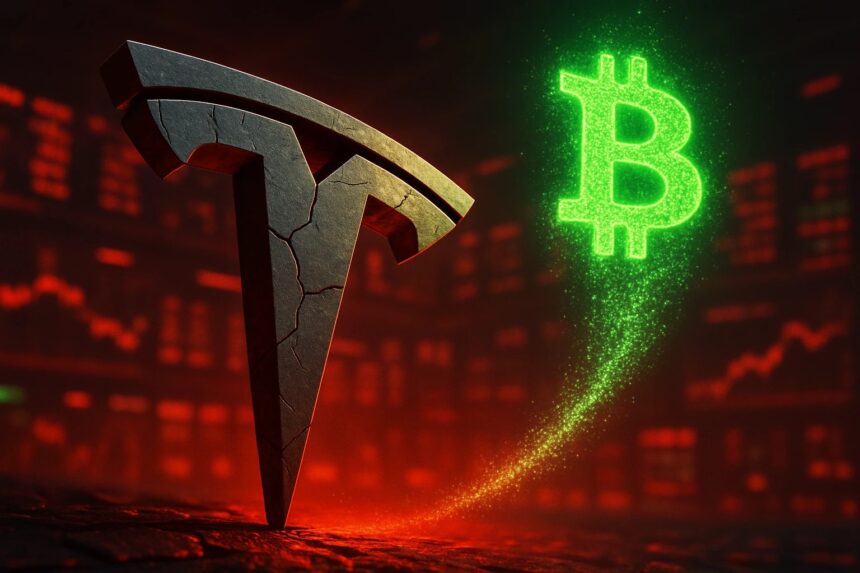Korean Retail Investors and Tesla’s Stock
For years, Korean retail investors have supported Tesla, playing a key role in the company’s global stock market surges. However, in August 2025, these investors pulled out an astounding $657 million from Tesla stock, marking the largest monthly outflow in over two years. This withdrawal goes beyond just direct stock investments; leveraged products connected to Tesla, like the 2x leveraged exchange-traded fund (ETF), TSLL, experienced outflows totaling $554 million in August 2025, the largest since early 2024. For retail investors who previously enhanced Tesla’s gains, this sell-off showcases a notable drop in enthusiasm. It represents more than just financial numbers; it signals a change in investor confidence, waning trust in the electric vehicle (EV) company’s future, and a growing interest in alternative investment avenues, such as US-listed cryptocurrency firms. This shift is significant, considering that Korean investors still retain about $21.9 billion in Tesla shares, their largest foreign equity holding. Although this does not eliminate their long-term commitment, it underscores the increasing uncertainty regarding Tesla’s future trajectory.
Did you know? South Korea-based exchanges like Upbit and Bithumb handle billions daily, making Seoul a center for global crypto liquidity.
Reasons Behind Korean Investors’ Withdrawal from Tesla
Korean investors are stepping back from Tesla after years of loyalty due to concerns regarding the company’s direction, among other factors. Among these reasons are:
- Missed promises: Tesla has frequently failed to meet ambitious deadlines. For example, Musk had promised 1 million robotaxis by 2020 and widespread full self-driving (FSD) capability, yet years later, the technology is still in beta. Similarly, the Cybertruck, which faced numerous delays, only began deliveries in late 2023, years behind schedule. The much-anticipated next-generation Roadster, expected to launch in 2020, may now roll out in 2025.
- Political fallout: Musk’s continual involvement in US politics and social issues, including a public disagreement with President Donald Trump and divisive commentary on social matters, has cast a shadow over his credibility. His brief foray into government and subsequent exit have seemingly further diminished his reputation among some groups.
- Declining sales: In Q2 2025, Tesla’s global deliveries experienced a drop of 13%-13.5% year-over-year, with approximately 384,122 units delivered compared to 443,956 in Q2 2024. In Europe, sales in July 2025 plummeted 40% year-over-year, with Tesla delivering just 8,800 cars. Year-to-date, the company’s sales fell by 34%, and its market share in the EV sector dropped from 11% to 5%.
- Rising competition: Competitors such as Chinese automakers BYD, Nio, and XPeng, along with European giants like Volkswagen, are providing more affordable, feature-rich EVs. This influx of alternatives has adversely impacted Tesla’s market dominance. For instance, BYD’s July sales in China tripled to approximately 13,500 units, surpassing Tesla’s 8,800. Similarly, XPeng recorded 37,709 units in August 2025, marking a 168.7% year-on-year increase, while Nio achieved record deliveries of 31,305 vehicles, a rise of 55.2% YoY. BYD emerged as the top seller, with 373,626 EVs sold in August and over 1.1 million EVs in Q2 alone, nearly three times the number of Tesla’s Q2 deliveries of 384,122 vehicles.
- Unpredictable leadership: Musk’s sudden changes, including purchasing Twitter (now X), prioritizing AI projects over EVs, and abrupt management transitions may have fostered uncertainty about Tesla’s focus.
Did you know? Nearly one in five South Koreans now invest in digital assets, with adoption reaching over 25% among individuals aged 20-50.
The Shift of Korean Investors from Tesla to Crypto
South Korean retail investors, known for their informed decisions in global equities, are increasingly turning their focus to cryptocurrency-related stocks. This transition has become evident as of September 2025, pointing to a new trajectory for Korean investments abroad. By mid-2025, South Korean investors had channeled over $12 billion into US-listed cryptocurrency firms. The pace and volume of this investment wave illustrate how Korean traders, often referred to as “fearless retail,” are adopting cryptocurrency as both a growth opportunity and a hedge against dwindling confidence in traditional stocks like Tesla. August 2025 underscored the intensity of this shift, with investors assigning $426 million to Bitmine Immersion Technologies, a company intrinsically linked to Ethereum’s growth. Additionally, Circle, the USDC issuer, garnered $226 million, while Coinbase, the largest cryptocurrency exchange in the US, attracted $183 million from Korean investments. Even high-risk instruments have seen robust demand, as a 2x leveraged Ether ETF drew $282 million in the same month, highlighting retail investors’ eagerness for amplified exposure to the sector. This surge in Korean retail investment in cryptocurrency stocks appears to signify more than speculative activity; it seems to reflect a fundamental shift in investor preferences, one that may impact Asian capital flows into global markets and elevate cryptocurrency as a mainstream asset class.
Factors Driving the Pro-Crypto Shift in South Korea
The shift in South Korea from traditional equities to cryptocurrency-related assets stems from a mix of social, regulatory, and economic factors. Together, these elements elucidate why the country has evolved into one of the globe’s most active retail markets for digital assets. The allure of cryptocurrency in South Korea is deeply rooted in its demographics; approximately 20% of South Koreans now hold digital assets, with this percentage climbing to 25%-27% among those aged 20-50. This demographic encompasses individuals with significant financial resources and an appetite for risk. They have grown up amidst the rapid integration of digital technologies, from mobile payments to online trading platforms, cultivating a cultural affinity for speculative investments. This blend of technological proficiency and willingness to take risks aligns seamlessly with cryptocurrency investment.
Regulatory matters that were once hurdles for crypto growth have transformed into a supportive influence, as South Korea’s approach to cryptocurrency regulation is evolving to be more favorable. This is evident through the introduction of the Virtual Asset User Protection Act (VAUPA) in 2024, aimed at protecting investors and deterring unfair trading practices. Additionally, plans for the Digital Asset Basic Act (DABA) are underway, aiming to create a comprehensive regulatory framework for all virtual assets.
South Korea’s economic environment has also become more accommodating for cryptocurrency adoption. Persistently low interest rates and a scarcity of local investment opportunities push investors to consider higher-yield alternatives, like digital assets. Furthermore, the slowdown in traditional sectors, such as automotive and manufacturing, drives investors to seek alternative return sources. A weakening won, alongside significant capital influx into dollar-backed stablecoins, has further accelerated investment in crypto assets.
Did you know? The Korean won consistently ranks as one of the top three fiat currencies traded against Bitcoin (BTC) worldwide.





















